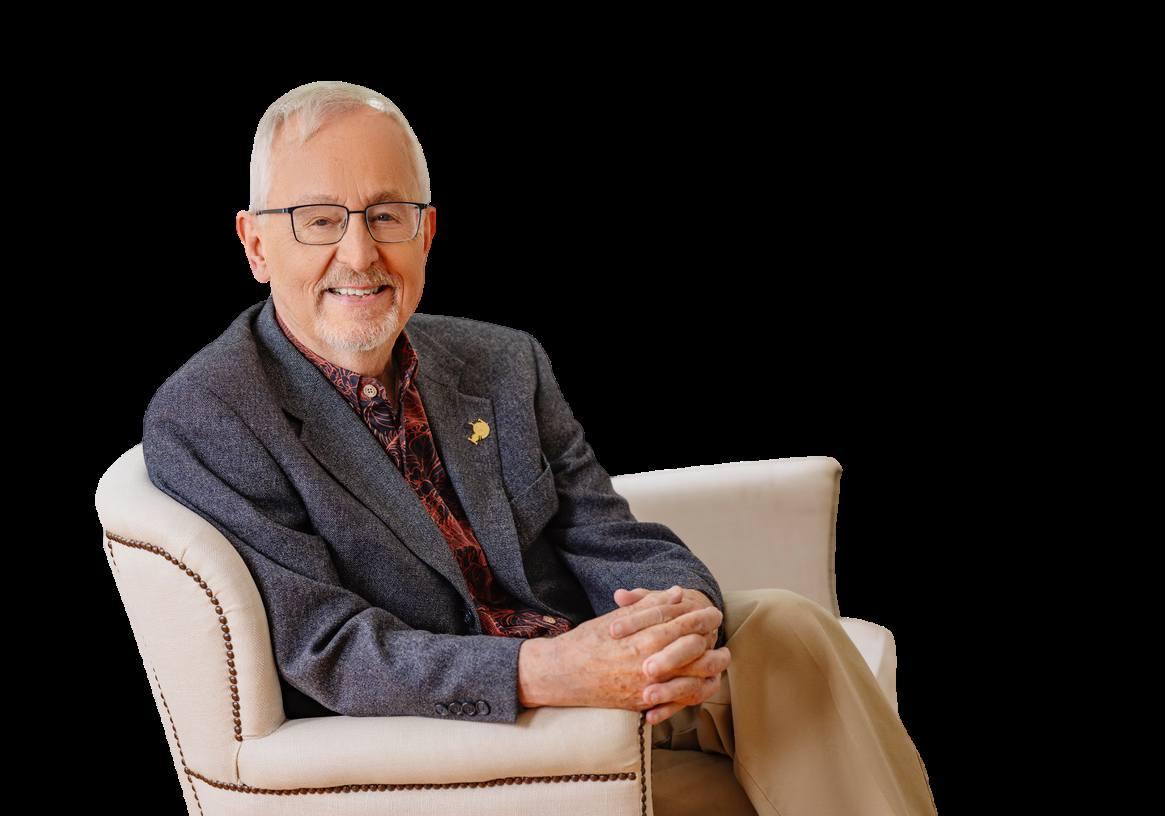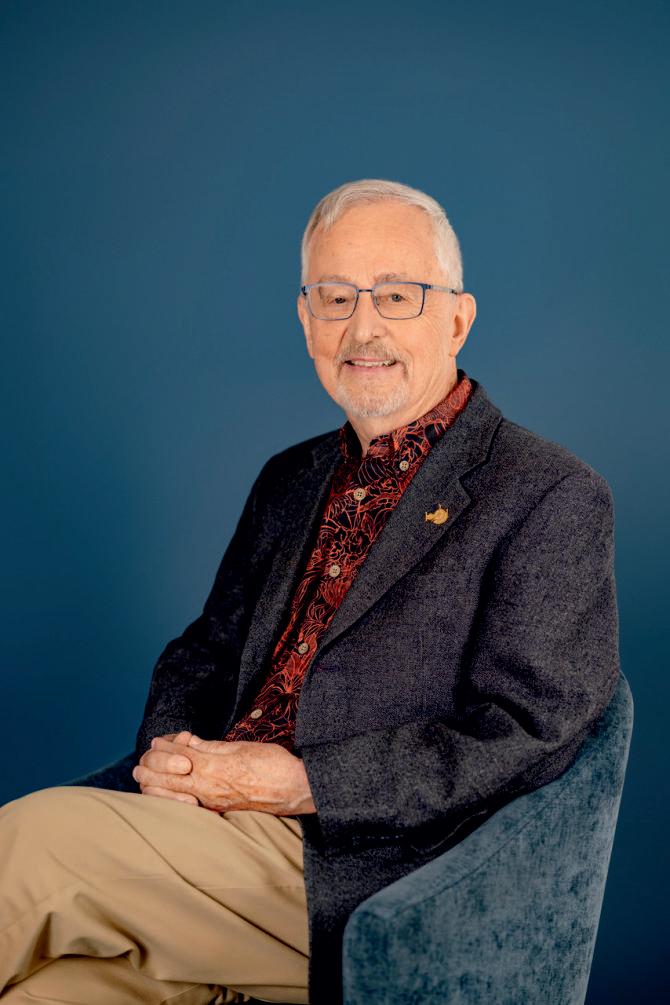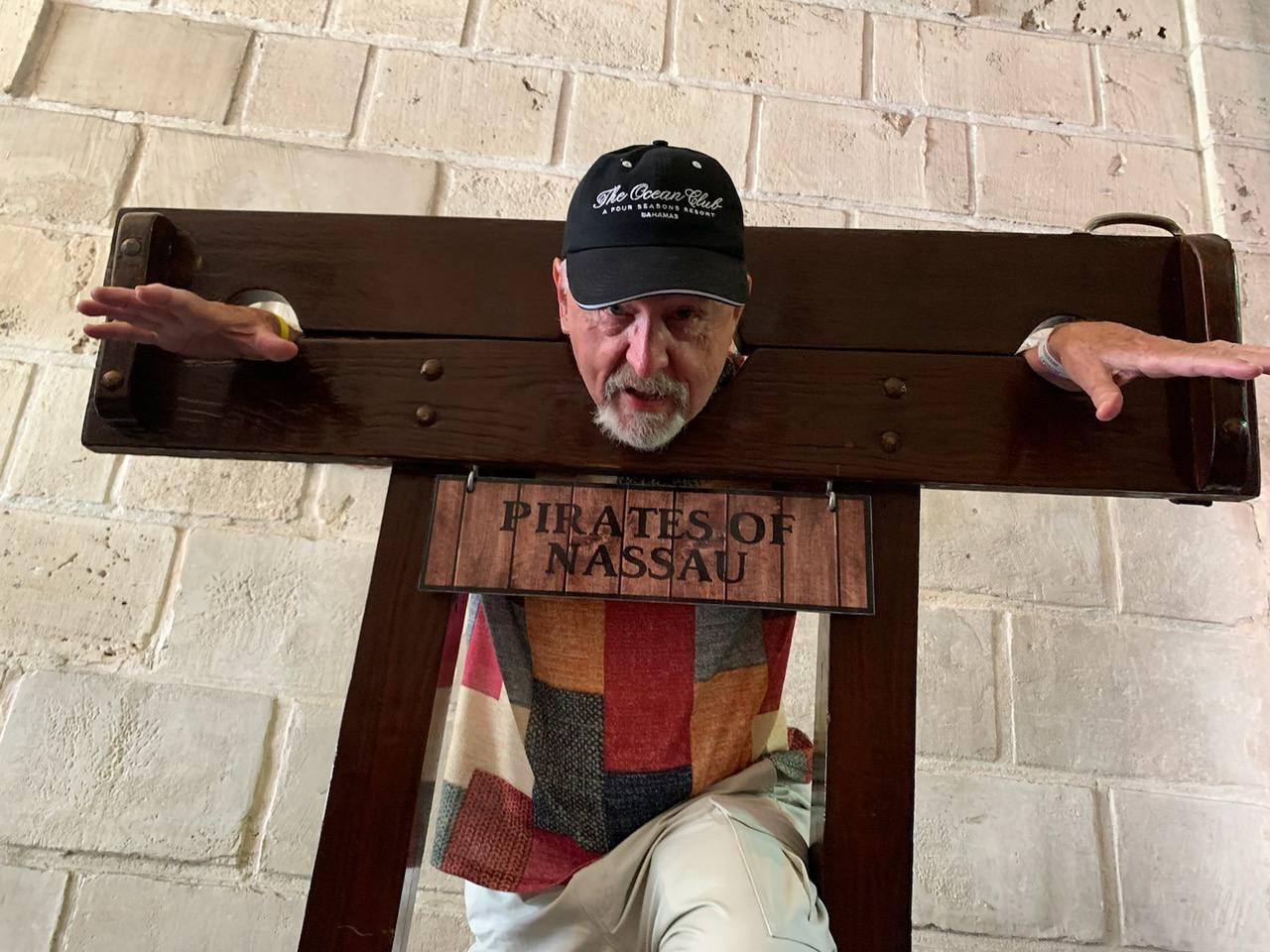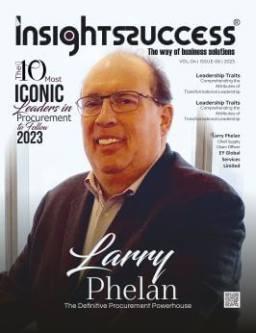








Educationstandsasoneofthemostpowerfultoolstoshapethefutureandbehind
everytransformativeeducationaljourneyisavisionaryleader.InthisInsights Successedition, The 10 Most Inspiring Leaders in Education, 2025,wehonor theexceptionalindividualswhoarenotonlyshapinginstitutionsbutalsoempowering minds,communities,andcultures.
Theseleadersareredefiningwhateducationmeansinanincreasinglycomplexworld. Fromembracinginnovationandinclusivelearningpracticestochampioningstudentcentereddevelopmentandlifelonglearningmodels,theirworktranscendsconventional boundaries.Theyarenotcontentwithmaintainingthestatus;theyarebuildingnew frameworks,integratingtechnologywithempathy,andfosteringenvironmentswhere creativity,curiosity,andresiliencecanthrive.
Whatunitesthemisnotjusttheirtitlesoraccolades,buttheirrelentlesspassionfor makingadifference.Theirstoriesofferpowerfulinsightsintohowleadershipin educationmustevolvetomeettheneedsofagenerationthatlearnsdifferently,thinks critically,anddreamsboldly.
Asyouexplorethisedition,mayyoubeinspirednotonlybytheiraccomplishmentsbut alsobytheircommitmenttoservice,adaptability,andvision.Atitscore,thisissueisa celebrationofeducatorswholeadnotjustwithintellect,butwithheart.
Toeveryreaderinvestedinthefutureoflearningwehopethisinspiresyourown journeyinnurturingthenextgenerationofthinkers,leaders,andchange-makers.
Happy Reading!



Editor-in-Chief
Merry D'Souza
Managing Editor Executive Editor
Preston Bannister
Visualizer
David King
Senior Sales Managers
Jenny Fernandes
Art & Design Director
Rosy Scott
Assistant Editor
Michael Wayne
Bruno Alves, Jack McDowell
Marketing Manager Technical Head
James M.
Jacob Smile
Technical Specialist
Irvin Wilson
SME-SMO Executive
Steve Rodrigues
Robert Brown
Circulation Manager July, 2025


Database Management
Stella Andrew
Associate Designer
Angela Ruskin
Business Development Manager
Ryan Brown
Sales Executive
Max Floyd Simon, Tom
Business Development Executives
Digital Marketing Manager
Dominique T.
Research Analyst
Frank Adams
Technology Consultant
David Stokes
sales@insightssuccess.com
We are also available on :




Copyright © 2025 Insights Success , All rights reserved. The content and images used in this magazine should not be reproduced or transmitted in any form or by any means, electronic, mechanical, photocopying, recording or otherwise, without prior permission from Insights Success. Reprint rights remain solely with Insights Success. Follow us on : www.facebook.com/insightssuccess/ www.x.com/insightssuccess
AntonioVenece Founder&Director
BenN Founder&Chancellor
BernardoNavarro AssistantDean
BoThomsen Headof EducationalImpact
HiteshBhagat SchoolPrincipal
MatthewBurfield SeniorVice President-Education
MegelBarker Headof MiddleSchool
NeilHopkin Directorof Education
PhilBaty ChiefGlobal AffairsOfficer
RichardLarson Professor
GeeksAcademyEurope geeks.ltd/academy
MinervaUniversity
FloridaNationalUniversity education.lego.com
LEGOEducation minerva.edu
DubaiInternationalAcademy diadubai.com
GEMSEducation gemseducation.com
TASISTheAmerican SchoolinEngland tasisengland.org
FortesEducation forteseducation.com
TimesHigherEducation timeshighereducation.com
MIT mit.edu
Creativeeducationpioneerblendingentrepreneurship,pedagogy, andcommunityengagementtobuildlearner-centeredecosystems thatencouragecriticalthinkingandpersonalgrowth.
Entrepreneurialinnovatorpassionateabouttransforming educationthroughpurpose-drivenleadership,policyadvocacy, andscalablemodelsthatempowerlearnersandeducatorsalike.
Academicstrategistwithstrengthsinresearchdevelopment, studentengagement,andinstitutionalcollaboration,fostering globalpartnershipsandexperientiallearning.
Expertineducationalimpactassessment,knownfordriving data-informedimprovements,stakeholdercollaboration,and transformativelearningoutcomesacrossdiversesystems.
Visionaryinholisticeducation,adeptatfacultyempowerment, technologyintegration,andstudentwellbeinginitiativesthat fosterinnovationandacademicintegrity
Strategicleaderinglobaleducation,withexpertiseininstitutional development,cross-culturalengagement,andlarge-scaleprogram implementationfocusedonimpactandexcellence.
Aninspiringeducationalleaderknownforstudent-centered approaches,facultymentorship,andcreatinginclusivelearning environmentsthatnurtureacademicexcellenceandcharacter development.
Globalthinkerinprogressiveeducation,skilledincurriculum reform,leadershipstrategy,andcross-culturalcollaboration, fosteringforward-thinkinglearningsystemsworldwide.
Arenownedvoiceinglobalacademicrankingsandhigher educationstrategy,skilledindataanalytics,international relations,andthoughtleadershiponinstitutional competitiveness.
Aseasonedacademicwithdeepexpertiseincurriculumdesign, interdisciplinarylearning,andeducationpolicy,drivingthought leadershipandinnovationacrosshighereducationframeworks.



Prof. Richard C. Larson, renowned globally for his
groundbreaking work in operations research and appliedsystemsanalysis,hasspentoverfivedecades solving real-world problems through rigorous scientific methods With an illustrious academic and professional journey rooted at the Massachusetts Institute of Technology (MIT), his impact spans across emergency response, public healthplanning,educationalreform,andworkforceanalytics. From urban policing to pandemic modeling, Prof. Larson’s versatile approach to complex systems has consistently generated transformative insights, influencing policy, industrypractices,andacademicmethodologiesalike.
His efforts are not confined to the theoretical or academic realm. Prof. Larson has taken bold strides in translating his researchintoreal-worldimplementations.Whetherdesigning queueing models that optimize emergency services or pioneering online education networks that cross geographic boundaries,hehasconsistentlymergedsciencewithservice. Through leadership roles at organizations like ORSA and INFORMS,andthroughhisfoundationalworkininstitutions likeMITLINCandCAES,hisdedicationtobetteringsociety throughoperationsresearchisevident.
In this document, we explore Prof. Larson’s multifaceted contributions—from award-winning research and mediaacclaimed innovations to his pedagogical ventures and advisory roles on governmental boards These accomplishments collectively represent a unique blend of intellectual rigor and social commitment.As stated by Prof. Larson himself, this journey has always been about using models and logic to solve human challenges—a belief that continuestoguidehisactivepursuitseventoday.
Prof Richard Larson’s professional narrative reflects a relentless pursuit of applying operations research (OR) to real-world service systems. With over 175 scientific publicationsandsixbookstohisname,hiscontributionshave
shaped the way academics and practitioners understand complex networks—especially in urban and public settings. One of his early and acclaimed works, Urban Police Patrol Analysis (1972), earned the Lanchester Prize, reflecting its pivotalroleinreformingemergencyresponsesystems.
Throughout his career, Prof. Larson has applied queuing theory and systems engineering to tackle large-scale problems in logistics, disaster response, and even the psychology of waiting lines. He pioneered methods like the QueueInferenceEngineandtheHypercubeQueueingModel, tools still referenced today in advanced operational frameworks.Thenickname"Dr Queue,"givenbythemedia, reflectshisauthoritativepositioninthisspace.
Beyond theoretical constructs, Prof. Larson has advised numerous U.S. governmental agencies and public systems including the U.S. Postal Service and the City of NewYork. His belief has always been that systems research is most impactful when it engages with policy, integrates with practice,andultimatelyelevatespublicservicedelivery
Public health has been a recurring theme in Prof. Larson’s research,wherehehastackledcomplex,urgentproblemswith interdisciplinary solutions. One of his notable achievements includesco-authoringtheaward-winningpaperontheeffects ofH1N1vaccinedistributionintheU.S.,publishedin Value in Health (2012). This paper combined logistics modeling w
recommendations.
His role on the Institute of Medicine’s Board on Health Sciences Policy and the Standing Committee on Emergency Management and Medical Response Integration further exemplifies his applied impact in national healthcare strategies. From pandemic management to maternal health initiatives in rural India, his work bridges modeling with grassrootsimplementation.



Inrecentyears,Prof.Larson’sresearchhasexploredtheuseof sewer sensors to detect early outbreaks of COVID-19, provingonceagainhisabilitytoadaptORmethodologiesto contemporarychallenges.Hisresearchcontinuestohighlight howsmartmonitoringsystems,combinedwithdataanalytics, canplayacrucialroleinproactivepublichealthplanning.
From 1995 to 2003, Prof. Larson directed MIT’s Center for Advanced Educational Services (CAES), where he focused on bringing digital learning tools to both local and remote learners. Recognizing early the power of internet-enabled education, he launched initiatives long before MOOCs and ed-techplatformsbecamemainstream.
He later founded MIT LINC (Learning International Networks Consortium), a global project dedicated to democratizing access to education via technology Through eight international symposia, LINC brought together educators, policymakers, and technologists to explore how pedagogycanevolveacrossculturesandgeographies.
As the principal investigator of the MIT BLOSSOMS Initiative, Prof. Larson continues to drive STEM education reformbycreatinganddistributinginteractivevideolessons. His commitment to learning innovations reflects his core beliefthateducationmustevolvetomeetthedynamicneeds ofthe21st-centurylearner
Prof.Larson’slonglistofawardsandhonorsisatestamentto his interdisciplinary influence and leadership. From being elected to the NationalAcademy of Engineering in 1993 to receiving the Kimball Medal and the INFORMS President’s Award,hisworkhasbeenacknowledgedbytheworld’smost respectedacademicsocieties.

He was also the first-ever recipient of the Lifetime Achievement Daniel Berg Medal, awarded in 2017 in New Delhi for his “significant contributions to technology innovation, service systems and strategic decision making.” He has been honored by international organizations across North America, Europe, and Asia, speaking to the global resonanceofhiscontributions.

Whether addressing Congress or advising international universities, Prof. Larson’s influence is not bound by geography His career illustrates how deep theoretical knowledge, when combined with practical insight, can generateglobalimpact.
Beyond academia, Prof. Larson has played key roles in severalentrepreneurialventures.HefoundedPublicSystems Evaluation, Inc., and chaired companies like ENFORTH Corporation and Structured Decisions Corporation. These enterprises served as conduits to translate research findings intoscalableapplications.
Hisroleintheseventuresunderscoresacriticalelement of his legacy: bridging the gap between research and practice.TheseorganizationsfocusedonapplyingOR methods to real-world challenges in transportation, urbanservices,andinformationmanagement,further demonstrating his commitment to societal advancementthroughsystemsthinking.
In2023,Prof.Larsonpublished Model Thinking for Everyday Life: How to Make Smarter Decisions, markinganewphaseinhislifelongcommitmentto systems education. This book also the first-ever published by INFORMS translates complex operational concepts into everyday decisionmakingtools.
Through this book and his ongoing work at MIT’s Institute for Data, Systems, and Society (IDSS), Prof. Larson continues to champion the value of model-based reasoning. He believes that in a world overwhelmed by information, the ability to think in models provides a clarity thatdrivesbetterdecisions.
Prof
L

’s
s departments—fromElectricalEngineeringtoUrbanStudies, Civil Engineering, and IDSS—illustrate a career that has refusedtobesiloed.Hisinterdisciplinaryapproachremainsa modelforaspiringresearchersandeducators.
Prof. Larson’s story is not just one of intellectual excellence butalsoofsocietalrelevance.Histrajectory—fromwinning theLanchesterPrizeintheearly1970stoleadingpandemic



surveillance projects five decades later highlights the adaptabilityandenduringimpactofatruethoughtleader
Hiscontributionshaveinspiredgenerationsofscholars,many of whom have gone on to win accolades themselves. The legacy of Prof. Richard Larson is one of vision, rigor, and compassion. He has not merely observed systems—he has reshapedthem.
As Prof. Larson continues his journey, now focused on the application of operations research in modern education and health systems, he exemplifies the transformative power of disciplined thinking. His work remains a beacon for anyone seekingtoalignsciencewithservice.
RichardC.Larson’sacademiccareerbeganin1969whenhe was appointed as an Assistant Professor in Electrical Engineering at MIT.This role laid the groundwork for what wouldbecomealifetimeofacademicinquiryandinnovation.
By1971,heexpandedhisteachingtoincludeUrbanStudies and Planning, reflecting his growing interest in interdisciplinaryapplicationsofengineeringprinciples.This dual focus remained a defining feature of his academic trajectory
His early appointments were marked by a series of progressive roles that illustrated both his versatility and academicprowess.Between1972and1979,Larsonheldthe position of Associate Professor, bridging three distinct yet interrelateddomains:UrbanStudies,ElectricalEngineering, andComputerScience.Thisraretrifectapositionedhimatthe intersection of infrastructure, technology, and policy, allowing him to influence a wide array of students and researchers.
By 1979, he had become a full Professor, a position he held across multiple departments including Electrical Engineering and Urban Studies & Planning His work continued to evolve, reflecting both changes in academic landscapes and the growing complexity of the systems he soughttounderstandandimprove.
As Larson’s career progressed, so did his academic focus. From 1988 to 2003, he served as Professor of Electrical Engineering exclusively, before expanding into the DepartmentofCivilandEnvironmentalEngineeringandthe Engineering Systems Division (2003–2009). His move into systems engineering signaled a strategic pivot that acknowledgedtheincreasingneedforintegratedapproaches tocomplexglobalchallenges.
In 2009, he transitioned fully into the Engineering Systems Division, and later into the Institute for Data, Systems, and Society(IDSS)in2015.HiscontinuingroleasaPost-Tenure Professor at IDSS from 2018 underscores his ongoing commitment to advancing data-driven solutions to social problems.
Larson’sacademicappointmentsabroadfurtherenrichedhis perspective.HeservedasVisitingAssociateProfessoratthe University of California, Berkeley in 1976, and later as Visiting Professor of Operations Research at the Technical UniversityofDenmarkin1981.


Educational leadership is shifting in response to the evolvingneedsofthe21st-centurylearner.Hierarchy management is giving way to or being supplemented by more networked, participative, and evidence-based leadership Today'seducationleadersarenolongerjustcalled upontomanageinstitutionsinacost-effectivemannerbutalso to innovate, build learning communities, and keep pace with technological innovation. This is fueled by international pressures like the increased use of artificial intelligence, classroomdiversity,andthatschoolinghastobemoreinclusive. As educational systems become more interdependent and complicated,leadershipinthisfieldwillbenotonlycapableof appreciatinginnovationasameansbutalsoasamindset The articlebelowisareactiontothreewidespreadtrendsthatwill define the future of education leadership: the convergence of technologyanddata-informeddecision-making,theexpansion of distributed leadership and teacher voice, and the revitalization of social-emotional learning and cultural responsiveness
Technology Integration and Data-Informed DecisionMaking
Data-informed decision-making and intelligent technology exploitation are among the most prominent of education leadership trends The current education leaders are using digital media to gather instant data on student behavior, participation, and performance This data enables them to respond in a timely manner, align instruction, and make periodic adjustments to instruction technique as well as institutionpolicy.AIplatescandetectgapsinknowledge,which can forecast student performance and allow for personalized learning streams through which the leaders will be well equippedtoallocateresources
Technology has penetrated administrative duties and communicationsystemsatdistrictandschoollevelstoo Cloudbased infrastructures facilitate staff collaboration, automate reporting frameworks, and add more transparency to


stakeholderssuchasparentsandthecommunity.Beyondthis, hybridandblendedlearningsettingscallfortechnology-savvy leaders who can guide their institutions to technological advancement Revolution will call for ongoing innovation pairedwithanopenmindwillingtoadoptthelearningsettings offeredbynewtechnologies
Anotherparadigmaticshiftreorientingleadershipinschoolsis the application of distributed leadership structures that redistribute authority and accountability from one source to a widergroupofleaders Themodelguaranteesteamworkamong teachers, administrators, and support staff through shared ownership and shared responsibility culture Through leadershipdelegation,schoolscanleveragemultiplestrengths and subjects of teachers and thus accomplish improved innovativesolutionsanddecision-making.
At the center of this model is teacher leadership Through teacherleadershipsharedamongthem,theybecomemotivated, proud, and committed to school improvement Professional learningcommunities(PLCs),instructionalcoachingpositions, andpeermentorshipprogramsarejustafewamongthewaysin whichteachersareassumingleadership.Thisparticipativeopen culture not only helps teachers stay on board but also creates innovation at the classroom level as teachers try out new pedagogies and curriculum with the support of the leadership team The outcome is an adaptive and responsive learning environment that becomes more responsive to the needs of studentsandemployees.
Leaders in education are mapping out the role of socialemotionallearning(SEL)andculturalresponsivenesstobuild inclusive, humane school cultures SEL initiatives provide space for students to develop skills like empathy, selfmanagement, resilience, and responsible decisionmaking buildingblocksofschoolandlifesuccess.Leadersin education now have the responsibility of weaving SEL into
policy, curriculum, and school culture. This does encompass offeringadditionalteacherdevelopment,theuseofrestorative justicepractices,andgeneralemphasisonemotionalwell-being inadditiontoacademicsuccess Culturalresponsivenessdoes encompass sensitivity and respect of the students' culture of being multiculturally diverse and the taking of learning and putting it and interpreting it into practice to apply in teaching andleadership.
Inclusiveleadershipdoesmeanleadingwithconsciousintentto disrupt structural barriers and biases that most readily harm marginalized groups It is a trend throughout highly multiculturalsocieties,whereeducationleaderswillbeaskedto navigate dense interlacements of race, language, identity, and equity Pedagogieslikeculturallyresponsivepedagogy,equity audits, and anti-bias training are becoming at the forefront of leadershippractice.Byestablishingemotionalsafetyandsense ofbelongingspaces,leaderscancreateamoreempatheticand justlearningcommunityforall
The terrain of educational leadership is being reshaped in harmony with larger societal, technological, and pedagogical developments. They must be visionaries, collaborative changemakers, and innovators who are skilled at working in conditionsofuncertaintyandemployingemotionalintelligence to lead Technology and data analysis further drive evidencebased decision-making, and distributed leadership models invigorate and empower educators as well as promote innovation from within. Increased emphasis on socialemotional learning and cultural responsiveness even makes schools not only educationally robust but emotionally and sociallyfulfillingaswell.Instructionalleaderswillhavetobe learner-focused, culturally sensitive, and responsive in an attempttosurviveinthisnewenvironment Asinnovationisthe foundation of leadership practice, school achievement and othermodelsofschoolorganizationwilldependmoreandmore on the ability of leaders to hear change, tap collective intelligence, and create a setting in which teachers and all learnerscansucceed.








www.insightssuccessmagazine.com













Intoday’srapidlyevolvingworld,leadershipisnolonger
justaboutdirectingoperationsorensuringefficiency.The mostimpactfulleadersarethosewhoinspirechange,build resilientcultures,anddriveinnovationfromwithin.Thisisthe essence of transformational leadership At its core, it’s about more than leading—it’s about elevating individuals and reshapingorganizationsforamoresustainablefuture.
To achieve this, one must adopt thoughtful, purposeful leadership strategies that move beyond routine management practices.Thesestrategiesnotonlyguideteamsthroughchange but also create conditions for lasting, meaningful transformation
Everylastingtransformationbeginswithacompellingvision This vision should not only outline a future goal but must resonateemotionallywitheveryindividualintheorganization. It gives people something to believe in a reason to push past comfortzonesandthinkbeyondtoday’stasks
Leaderswhosucceedincreatinglastingchangearethosewho consistentlycommunicatethisvisionwithclarityandpassion They don't just mention it in meetings or slideshows they embodyitintheiractions,language,anddecisions.Themore aligned a team feels with the shared vision, the stronger their commitmenttothejourneyahead.
Transformational leadership demands consistency between wordsandactions.Aleaderwhoadvocatesforadaptabilitymust themselves be open to feedback and change. When leaders model integrity, resilience, and humility, their teams are far morelikelytodothesame.
This type of leadership builds trust one of the most critical elements of sustainable transformation People don’t follow titles;theyfollowauthenticity Andwhentrustisstrong,teams
are more willing to take risks, contribute ideas, and work throughchallengestogether.
Empowering others isn’t about giving up control; it’s about creating shared ownership. Effective leadership strategies alwaysincludefindingwaystoletotherslead.Thismightmean inviting team members to participate in decision-making or givingthemroomtosolveproblemsintheirownway.
When individuals feel trusted and valued, their engagement soars Theybecomemorecreative,morecommitted,andmore willing to go the extra mile not because they must, but becausethey want to Aculturebuiltonempowermentsustains itselflongafterinitialchangeshavebeenmade.
One common thread among transformational leaders is a commitmenttocontinuouslearning Theynotonlyencourage personaldevelopmentwithintheirteamsbutalsoseekgrowth for themselves Organizations that thrive through change are thosethatprioritizeeducation notjustintechnicalskills,but alsoinleadership,communication,andemotionalintelligence.
Embeddingdevelopmentintoeverydayroutinesreinforcesthe idea that growth is a constant Whether through mentorship, workshops, or regular feedback sessions, these leadership strategiesensurethateveryoneremainsadaptableandforward focused.
Leadership is fundamentally a human endeavor No strategy can succeed without empathy, listening, and understanding Emotional intelligence knowing how to manage one’s emotions and relate to others is a quiet but powerful force behindeverysuccessfulchangeeffort.
Transformational leaders listen more than they speak. They notice unspoken concerns, respond to resistance with compassion, and create safe spaces for people to express vulnerability Inhigh-stakesenvironmentswherechangecanbe stressfuloroverwhelming,thisemotionalgroundingbecomesa vitalasset
Sustainablechangecan’thappenwithoutinnovation However, innovation requires more than creative ideas; it requires a
culturewherepeoplefeelsafeenoughtotry,fail,andtryagain. Thiscanonlyhappenifleadersnormalizeexperimentationand eliminatefearoffailure
Rather than penalize mistakes, transformational leaders use themaslearningopportunities Theycelebratenotjustsuccess but effort and progress This kind of culture attracts forwardthinking individuals and positions the organization to evolve continuously ratherthaninfitsandstarts.
Change can often feel overwhelming if the end goal seems distant That’s why another essential leadership strategy is breaking down transformation into small, meaningful wins Celebrating these moments no matter how minor they seem reinforcesmomentum.
Recognition doesn’t always have to be formal Sometimes, a sincere thank-you or a moment of appreciation can go a long way When people feel seen and acknowledged, they’re more likelytostaymotivatedandinvestedinthelargermission
Transformational leadership is not about quick fixes or topdown mandates It’s about cultivating environments where peoplethrive,feelempowered,andbelieveintheworkthey’re doing Effective leadership strategies focus on building trust, enablinggrowth,andcreatingasenseofsharedpurpose
As organizations continue to face complex challenges from technological disruption to cultural shifts the demand for leaders who can inspire lasting change is increasing. By embracing transformational leadership with authenticity, empathy,andclarity,today’sleaderscanshapenotonlystronger teamsbutalsoamorehopefulandresilientfuture


